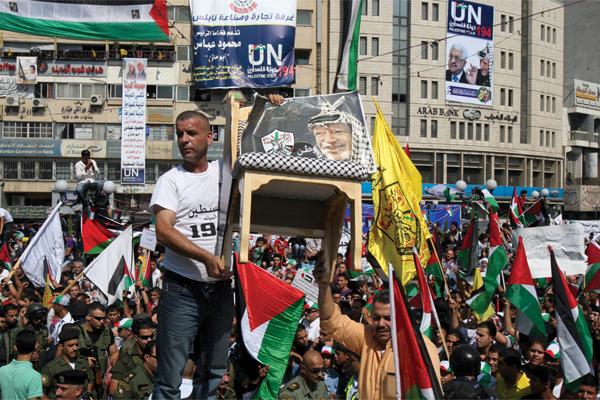
Last Friday, Palestinian Authority President Mahmoud Abbas announced that the PA would apply to the United Nations Security Council for Palestinian statehood.
The United States and Israel have been pressuring council members to either vote against the plan or abstain when it comes up for a vote. The vote would require the support of nine of the council’s 15 members to pass, but even if the Palestinians could line up that backing, a U.S. veto is assured.
The resumption of peace talks between Israel and the PA seems to be an elusive goal, with both sides digging in to positions that have tripped up negotiations for years. Israel insists that negotiations go ahead without any preconditions. But Palestinians say they will not return to the bargaining table without assurances that Israel would halt settlement building and drop its opposition to basing negotiations on the borders it held before capturing the West Bank, east Jerusalem and the Gaza in 1967.
Israel has warned that the Palestinian appeal to the U.N. will have a disastrous effect on negotiations, which have been the cornerstone of international Mideast policy for the past two decades. Israeli Prime Minister Benjamin Netanyahu, who is to address the General Assembly today, shortly after Abbas makes his own address, opposes negotiations based on 1967 lines, saying a return to those frontiers would expose Israel’s heartland to rocket fire from the West Bank.
Abbas and other Palestinian leaders have in recent weeks argued that internationally recognized statehood is a necessary step for Palestinians after several decades of failed talks have not significantly improved conditions for Palestinians living in refugee camps or produced a peace deal with Israel.
CAMPUS REACTION
On Wednesday afternoon, Bearcats for Israel, a pro-Israeli student group run through the Binghamton University chapter of Hillel, ran a “Talk Israel Tent” in front of the New University Union, as did groups at 25 other universities across North America, including Cornell, Berkeley and the University of Toronto. The group said the event was meant to educate students about Israel-Palestine relations and open discussions.
Student opinion about an impending UN decision on Palestinian statehood at BU, mirroring international trends, varied widely.
“I think everyone would like for Palestine to be its own state,” said Andrew Topal, president of Bearcats for Israel. “The issue is that the two sides need to sit and negotiate. The UN has a flawed voting system and can’t assume full control.”
Tareq Haddad, co-president of the soon-to-be chartered Arab Student Association, took a different view of the Palestinian move.
“Israelis are criticizing the Palestinians for acting unilaterally, but they are not really acting unilaterally, they are trying to make it a more multi-lateral process in bringing it to an international level … and not acting with just Israel,” Haddad said.
Some have asserted that the Palestinians’ bid for UN recognition is a tactic meant to generate leverage at the negotiating table with Israel.
Maoz Rosenthal, a visiting professor in the political science department who is from Israel, said he didn’t believe the Palestinian leadership will be successful in winning UN statehood approval, but that the move will put Israeli-Palestinian negotiations back on track.
Israeli Prime Minister Benjamin Netanyahu has opposed the Palestinian bid to gain recognition as a state. Israel’s political leaders say progress toward a settlement should be made through direct peace talks rather than an appeal to the United Nations.
The PA has indicated however that it believes it now has an opportunity to realize its goal of creating a sovereign state for Palestinians free from occupation, and it intends to press forward.
Israelis have voiced concerns over the threat to their country’s security posed by the potential prospect of a belligerent Palestinian state on its border.
While addressing the UN General Assembly Wednesday, U.S. President Barack Obama said, “Israelis must know that any agreement provides assurances for their security.”
“Peace will not come through statements and resolutions at the United Nations — if it were that easy, it would have been accomplished by now,” Obama said. “Ultimately, it is the Israelis and the Palestinians who must live side by side. Ultimately, it is the Israelis and the Palestinians — not us — who must reach agreement on the issues that divide them: on borders and on security, on refugees and Jerusalem.”
— Information from The Associated Press was used in this report.


